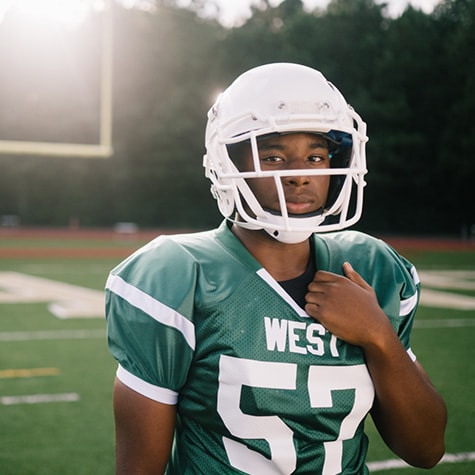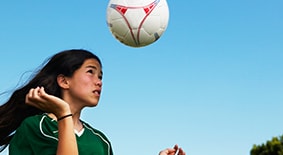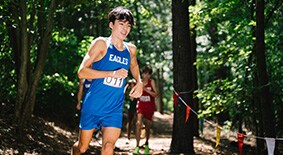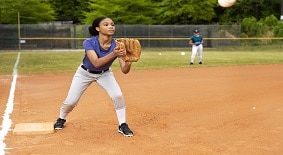Returning to School and Sports After Concussion
Updated 4/5/21
Recovery from concussion takes time. In fact, it can take weeks or sometimes months for concussion symptoms to subside. That’s why it’s important for kids to make a gradual return to activities, including school and sports.
Pediatric concussion is a mild brain injury, but it can lead to long-term complications if not managed appropriately. It’s important for parents to remember that recovery takes time. That’s why clinical guidelines recommend a gradual return to activities, including school and sports.
How kids and teens can heal at home after a concussion
Any activity that taxes the brain and body should be limited in the days immediately following a concussion diagnosis when symptoms are most severe. Your child should limit or avoid the following:
- Difficult cognitive tasks that require extreme concentration
- Lengthy social visits from family and friends
- Screen time, including TV, cellphones, video games and computers
- Bright lights and loud noises
Parents should watch children carefully in the first couple of days after a concussion. If their symptoms worsen, kids should stop what they’re doing and rest. If they experience new symptoms , such as slurred speech, seizure or weakness in the arms and legs, call your child’s pediatrician, visit an emergency department or dial 911.
Every concussion is different; however, it’s common for kids diagnosed with concussion to require some time off from school—typically about three days or less. Deciding when it’s time to return to the classroom is up to the student and parents, with guidance from a pediatrician. It’s not necessary for a child to be entirely symptom-free before returning to school, but a doctor should sign off before a return to normal activities.
“Just as every person is different, every injury is different,” says J. Stephen Kroll, MD, a Sports Medicine Primary Care Physician at Children’s Healthcare of Atlanta. “Concussions can vary as much as any other injury, which is why concussion protocol for treating the injury is not always the same.”
Typically, a child with pediatric concussion will resume school in stages, working from home on assignments initially, returning to class part time, and then making a full return once the child has made it through a school day symptom-free. To ease your child’s transition back, you and your pediatrician can work with the school to develop an academic recovery plan.
What is an academic recovery plan for concussions?
An academic recovery plan provides clear guidance on how to gradually get your child back into his normal school routine. It gives teachers an overview of symptoms to look out for that may signal that your child needs a break. It also outlines your child’s limitations as a result of concussion—increased difficulty focusing or retaining information, for example—and steps the school can take to help a student overcome those limitations should symptoms continue beyond 14 days. These academic accommodations may include a shorter school day, limiting quizzes and tests, and creating a makeup plan for assignments missed.
As your child continues to recover and is able to remain symptom-free after a full school day, he will be able to take on a greater academic load. If your child is still symptomatic after 28 days and is having academic difficulties, then it’s time to speak with his pediatrician about further evaluation.
No matter how eager your young athlete is to get back in the game, it’s important to wait until your child is back in school and symptom-free before she attempts to play sports or participate in PE class. The risks are just too great. Not only can premature physical exertion delay recovery, but returning to sports too soon, especially contact sports, can also put your child at greater risk for a repeat head injury with life-threatening consequences.
That’s why most states now have laws in place to ensure parents, coaches and athletes are well informed on how to manage concussion appropriately and get kids back to the activities they love safely. In Georgia, that law is the Return to Play Act.
Concussion recovery: 7 steps for your child to return to play
Just like the process for returning kids to the classroom after concussion, getting them back into sports is gradual. In general, no athlete shall return to play until he:
- Is completely symptom-free.
- Remains symptom-free after resuming a full school day.
- Remains symptom-free after progressing through steps 1 through 6 of the Return-to-Play Program.
- Receives written clearance from a qualified healthcare provider to return to play.
The Return-to-Play Program outlines seven stages or steps to help guide athletes, parents and coaches as they determine whether a child is ready to return to sports. Recommendations for each stage should be followed for a 24-hour period before moving on to the next:
- Stage 1: In this recovery phase, athletes should not be involved in any activity—to give their brains and body complete rest.
- Stage 2: As symptoms start to subside, athletes can do light aerobic activity, such as 10 minutes of walking or stationary biking.
- Stage 3: When athletes are symptom-free, they can increase aerobic activity and add in light resistance training, as well as low-risk activities like dribbling a basketball or playing catch.
- Stage 4: Athletes can begin sport-specific warmups and increase aerobic activity but must avoid head-contact activities.
- Stage 5: With supervision and regular symptom checks, athletes can resume contact training drills.
- Stage 6: A return to full-contact practice is acceptable for athletes with a doctor’s approval.
- Stage 7: Athletes are cleared to return to the sport and normal game play.
If symptoms return at any stage, athletes should drop back to the previous stage and only progress after 24 hours of symptom-free rest.
Does my child need testing after a concussion?
If your child plays a contact sport, such as football, lacrosse, soccer or basketball, or participates in a high-impact sport like cheerleading, an Immediate Post-Concussion Assessment and Cognitive Test (ImPACT) is recommended. This computerized test can help doctors better identify even subtle cognitive impairment and more accurately assess your athlete’s recovery from a concussion by providing a baseline for his “normal” cognitive function before a concussion occurs.
Not all sports are the same when it comes to concussion risk. Football carries the highest risk of concussion, followed by soccer, basketball and lacrosse. The return-to-play timeline will be different for these sports compared to sports like golf or swimming.
What does concussion recovery look like for my child’s sport?
Sport-specific concussion recovery guidelines are based on the seven stages outlined in the Return-to-Play Program. Note that these are general recommendations. It’s important to monitor your young athlete closely after every stage to help ensure he is ready to move to the next level.
- Baseball/Softball (en Español)
- Limited contact drills can resume at Stage 5, including live batting practice.
- Basketball (en Español)
- Passing, dribbling and stationary shooting can begin at Stage 4, along with solo rebounding, suicides and lay-up drills.
- Cheerleading (en Español)
- Light tumbling can resume at Stage 5, with a slow return to inversion moves and stunts.
- Boys Lacrosse (en Español)
- Players should ease their way into wearing helmets and gloves during aerobic activity, beginning at Stage 3 with a quick, 30-minute jog.
- Girls Lacrosse (en Español)
- Lacrosse-specific drills—cradling, scooping, shooting and more—can begin at Stage 4 if the player tolerated increased aerobic activity with no issues.
- Football (en Español)
- At Stage 5, football players can participate in limited-contact drills with a helmet and pads if they are symptom-free. This includes work with push pads and sleds, step and hit, run and hit, and others.
- Gymnastics (en Español)
- When gymnasts return to the gym, they should limit workouts to 60 minutes of light conditioning at Stage 3, with no upside-down or backward movements.
- Ice Hockey (en Español)
- In Stage 3, skaters should combine light resistance training with 30 minutes of skating with a helmet and gloves.
- Soccer (en Español)
- Players should ease back into heading the ball at Stage 5, with tossed headers taken from the knees and then from standing and jumping.
- Swimming (en Español)
- Swimmers should combine water activities with dryland training beginning in Stage 2 and resume block starts at stage 5.
- Wrestling (en Español)
- Minimal contact drills introduced at Stage 4 should be done at half speed, and pinning combinations can begin at Stage 5.
Every child is different, and every concussion is different, so give your child the time he needs to fully recover. Talk to your child’s coach or your pediatrician if you have any concerns about a particular drill or exercise.
We’re Here to Help Parents Navigate the World of Sports and Concussions

Help make sure your child receives the concussion care he needs.
At Children’s, we’re here to care for your child—so he can get back to being a kid. Our team is specially trained to care for concussions in kids and teens and can work with your child’s doctor to create a custom treatment plan.
Get AnswersStephen Kroll Jr., MD, a Sports Medicine Primary Care Physician in the Sports Medicine Program at Children’s Healthcare of Atlanta, is board-certified in pediatrics and sports medicine. Dr. Kroll specializes in the diagnosis and treatment of sports-related injuries, nonoperative musculoskeletal injuries, overuse injuries and concussion management. Dr. Kroll is also a founding member of the Pediatric Research in Sports Medicine (PRiSM) organization. Early morning appointments are available with Dr. Kroll at our orthopedic and sports medicine clinic at Children’s at Meridian Mark.
This content is general information and is not specific medical advice. Always consult with a doctor or healthcare provider if you have any questions or concerns about the health of a child. In case of an urgent concern or emergency, call 911 or go to the nearest emergency department right away. Some physicians and affiliated healthcare professionals on the Children’s Healthcare of Atlanta team are independent providers and are not our employees.
Contact Us 404-785-KIDS (5437)



